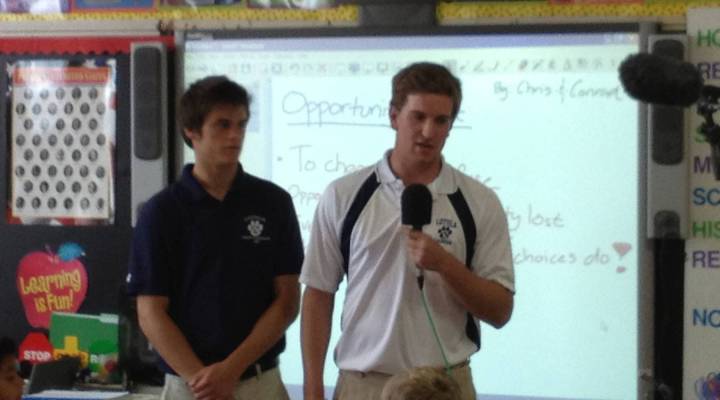
Starting financial education young

Tess Vigeland: When it comes to financial independence, the earlier, the better, right?
Kids would certainly agree — who wants to ask mom and dad for money? And many parents would be more than happy to surrender their position as financial overlords and the family bank.
But how early do you start teaching real economic concepts? How does elementary school sound?
Recess may be the favorite part of the day at St. Anne’s, a Catholic elementary and middle school in Santa Monica. But the lesson they’re about to get in Ana Renteria’s fourth grade class will surely run a close second.
Ana Renteria The only thing I want on your desk is a pencil!
Ms. Renteria quieted the class and handed it over to the day’s guest instructors.
Chris Tesorero: I’m Chris Tesorero, I go to Loyola High School. My favorite subject is economics, and today we’re teaching about economics.
Tesorero and his classmate Conrad Ukropina, both 18, were at St. Anne’s to talk the kids through some very basic tenets of finance.
Tesorero: Today we’ll be teaching about opportunity cost, something we’ll go into in a little bit. But I just want to see if you guys remember anything from the last lesson we had on economics and human capital.
Conrad Ukropina: Already got a hand up. What do you think Steven?
Steven: Human capital is, like, your personal… it’s how you are, I think. All the details that make you, yourself alone.
Tesorero: Mmhmm. That’s very good. Anyone want to add on to that? Yes, Aaron.
Aaron: It’s like who you are and how you feel.
Tesorero: That’s a great response. Basically, human capital is the individual skills that you have…
The visit was part of a program created three years ago by Tesorero and Ukropina’s high school economics teacher. Brian Held sends his Loyola students out to low-income schools to teach the fundamentals of finance to younger kids.
Brian Held: An old expression in the ed world is that teaching is learning. So by them going out to teach, I’m hopefully reinforcing to them just how important the economic concepts are. For them to know, but also for the kids that they’re it to.
Conrad Ukropina: All right, well basically, opportunity cost is basically with any choice that you make — like choosing, let’s say it’s a Friday night and you have to choose between going to a movie or staying home and studying, because I know that’s what I do on Friday nights. The opportunity cost is everything that you lose by not taking choice B.
Tesorero: That’s exactly it.
Student: If you do opportunity A and you want to go to both of them, you have to think of doing them in separate times, right?
OK, so it takes a little more explaining for 10-year-olds. But the key here is the rapt attention being lavished on the visiting teachers. These are high school people! High school star athletes, to be specific.
So if you’re going to learn about human capital and opportunity cost, you might as well learn it from the cool kids, right? And Tesorero and Ukropina get that.
Tesorero: Some kids, at young stages, they can come into high school and see instant money and working at McDonald’s or something like that and say, “Why college? I can earn money now.” What we’re trying to convey to them and human capital and opportunity cost lessons are that stay in school, you can make more money in the future and be more successful and reach your full potential.
Ukropina: We’re trying to tie everything back into school. Trying to get them to realize that their best chance to create their own human capital is through school.
Tesorero: Do you guys like these?
Student: Wow talk about creativity!
As the youngsters watched, their guest teachers put on, yes, kitchen aprons with pockets that contained tchochkes from different theme parks.
Tesorero: So today guys, we are going to be making a trip. Let’s imagine that it’s your birthday and we are either going to Disneyland or Legoland. You know, there’s opportunity costs to both options. But it really comes down to what decision you guys want to make.
They proceeded to outline a simple cost-benefit analysis to the theme parks and the kids made decisions about where they’d want to go. In the end, it was evident that the messages were getting through.
Sarah: I’m Sarah and I’m 10 years old. I learned that you should, like, pick the right thing that you want to choose and then you can do the other one another time.
Vigeland: Right. So it’s all about choices, right? Who else?
Eileen: My name’s Eileen and I’m 10, and I learned that money doesn’t matter. You can use it for a time where you really need it.
Vigeland: OK. How about over there?
Daniella: My name is Daniella and I’m nine years old. And what I learned from Chris and Conrad is that I should really do the right thing and choose what is really important.
Vigeland: Good. One more?
Steven Townsend: My name is Steven Townsend, I am nine-and-a-half years old. I’m turning 10 this July 5.
Vigeland: Happy birthday.
Steven: I learned about a lot of things that you can miss on by making just one choice, and what choices can be really hard to make.
See, I told you we could all learn about finance from fourth graders.
There’s a lot happening in the world. Through it all, Marketplace is here for you.
You rely on Marketplace to break down the world’s events and tell you how it affects you in a fact-based, approachable way. We rely on your financial support to keep making that possible.
Your donation today powers the independent journalism that you rely on. For just $5/month, you can help sustain Marketplace so we can keep reporting on the things that matter to you.


















